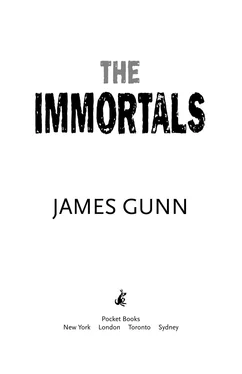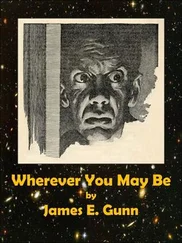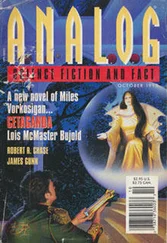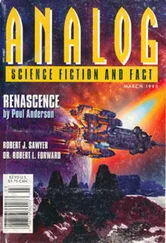“The alchemists left that to the magicians,” Pearce said. “Maybe because it wasn’t basic. Or maybe they thought they could buy love with unlimited wealth.”
“Or the promise of immortality,” she added.
He got up to leave, but she stopped him at the door.
“Fifty years,” she said. “You must be—”
“Ninety,” he said.
“You don’t look more than fifty,” she said. “If I didn’t know better, I might suspect that you have found the elixir and kept it to yourself.”
“Good genes,” he said, “and the power of positive thinking.”
And then, as the solid wooden door closed behind him, he stood in the hall, with its special hospital odor that spoke to him of the practice of medicine more than the stethoscope and the scalpel themselves, and wondered what he was going to do now.
* * *
He was late for his hospital rounds, but the summons from Julia Hudson had been urgent. Now he wondered about the hurry to inform him of termination and why it had come through the executive vice chancellor, in person, rather than through customary channels. Maybe, after all these years, the regents were trying to get him to resign, which might explain why Hudson hadn’t offered to finance his research out of the Center’s own funds. Or maybe Hudson had wanted to break the bad news in person, to soften the blow, and he was being paranoid again.
But that was soon driven from his mind by the patients waiting for him in room after room of the hospital wing devoted to geriatrics. As the population had aged, the wing had grown until now it occupied an area as large as that of the next two specialties combined.
His group of senior medical students had preceded him, but his resident physician and research assistant, Tom Barnett, was perfectly capable of supervising them and of replacing him, as, Pearce was sure, Barnett hoped someday to do. One problem with longevity, particularly longevity in career or profession, was the difficulty of the young in getting on: The road ahead was clogged with slow or stalled vehicles. Death was evolution’s way of improving the species, and if death is delayed, the basic processes of life are frustrated.
As one of the roadblocks on the highway of progress, Pearce felt a bit ashamed of the way he clung to his practice and his research. But he had never married, his work gave meaning to life, and he didn’t feel ninety years old. In fact, inside he felt about the same age as when he had stared down at a rejuvenated Leroy Weaver. He was as good as any physician on the staff, he knew—indeed, with the accumulated clinical experience of more than fifty years, he felt he was a good deal better. And his skills in the laboratory were superior to what they had been when he was forty and had been driven there by the miracle of Marshall Cartwright.
Now as he went from room to room and bed to bed, taking a hand here, feeling a brow there, checking a chart, speaking a cheerful greeting, asking an interested question by name, saying goodbye with feeling, he noted the ages of his patients. There were fewer sixty- or seventy-year-olds among them than there once had been when he was first starting his practice. Now most were in their eighties or nineties and a number of them into their hundreds.
People were living longer, but the diseases and systemic failures they avoided in earlier life left them prey to the degenerative diseases and cancers of old age. You avoid heart failure, and you live long enough to have a cancer metastasize from your prostate; you keep your kidneys and liver working properly, and your brain finally succumbs to stroke or Alzheimer’s disease. And the costs of treating the diseases of old age were far greater than the quick and easy deaths of youth or middle years. Even if one included the Acquired Immune Deficiency Syndrome related diseases. Small wonder the social costs of medical care had soared until today only those were treated who could afford to pay, and the rest were left to their traditional resources: nostrums and faith healers and the few clinics that hospitals such as this one kept open to the public. Mostly to the old to use as clinical material for finding cures to the diseases of old age. Someday, Pearce thought, the few who could afford the best of care would become totally dependent upon it, and medicine would turn for its source of vaccines and antibodies and even antibiotics to those who had been denied the benefits of modern medicine.
Pearce could foresee a time when medicine would become a kind of contemporary religion where the common people came to worship, and physicians, indistinguishable from witch doctors shaking their rattles over their patients to drive out demons, would become the priests of a new mythology. Their altar would be an operating table, and their communion, a vitamin tablet and an oral antibiotic.
Pearce caught up with his group of students before the end of rounds. The group had grown larger over the years, to match the growth in the geriatrics wing. Geriatrics was a growth industry, and medical students alert to the latest trends invested their time and hopes in an appropriate specialty. Pearce wondered if it had been different when he had made his own choice so many years before, but it was so long ago that his younger self was like a stranger and he could not remember.
He waited at the back of the group, unnoticed, while Barnett had each of them, in turn, prod the patient, poor Mr. Sam Aikens with his chronic nephritis, and jabbed at the physicians-to-be with hard questions, as if trying to trick them into a faulty answer that would allow him to display his erudition and wit, and demonstrate to everyone the necessity of study and of being right. It was one way of teaching, and he had been subjected to that in his medical school days, as well as the three-days-on and three-days-off ordeal of residency, but it wasn’t his way. A ready answer was not always a right answer, and being quick was often inferior to being thorough.
Mr. Aikens was a charity case. Barnett would have treated a paying customer more gently.
Barnett was quick, but his quickness had produced no better results in the elixir synthesis than Pearce’s thoroughness. Of course, he thought ruefully, there is little discrimination between failures.
“I’ll take over, Doctor Barnett,” he said, making his way to the front of the group. He felt the students’ relief and sensed the reluctance with which Barnett surrendered his place. He would have to do something for Barnett, he told himself, as he told the students about Mr. Aikens and his life and his family situation, and asked the patient to describe his symptoms. He asked each of them, in turn, to hold Mr. Aikens’s wrist and feel his pulse, a function measured better by instruments and recorded on a panel behind the patient’s bed, along with other vital signs. And he asked them to feel Mr. Aikens’s back gently, to sense his pain, and to try to get inside Mr. Aikens’s illness.
“All these devices,” he said, sweeping his hand around the room, “are wonderful, but they cannot replace the physician’s inner sense and a caring—one might almost say, a curing—touch.”
The students reacted differently as they were dismissed for the day, some of them relieved to discover that the practice of medicine had not yet been mechanized, others, uneasy in human relationships, resentful that this old doctor was asking them to do more than memorize the names of the body parts and the various ailments to which they were prone. But Barnett was gone before Pearce could tell him about the outcome of the grant application. When he got back to his office, he opened the piece of paper that Mr. Aikens had slipped into his hand when Pearce had held it.
“I need you,” the note read. “Come to 3416 East 10th tonight and ask for Marilyn. Destroy this note. We’re both in danger.”
Читать дальше












